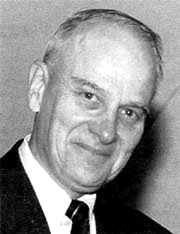 |
Imperfect Design Engineering as a Human Endeavour Thursday, April 14th, 2005 |
| Dr. William Wulf President, National Academy of Engineering Vice Chair, National Research Council |
"Growing global competition and the subsequent restructuring of industry, the shift from defense to civilian work, the use of new materials and biological processes, and the explosion of information technology - both as part of the process of engineering and as part of its product - have dramatically and irreversibly changed how engineers work."
|
|
William A. Wulf is on leave from the University of Virginia, Charlottesville, where he is a University Professor and AT&T Professor of Engineering and Applied Sciences.
Among his activities at the university are a complete revision of the undergraduate computer science curriculum, research on computer architecture and computer security, and an effort to assist humanities scholars exploit information technology. Wulf has also served as assistant director of the National Science Foundation; chair and chief executive officer of Tartan Laboratories Inc., Pittsburgh; and professor of computer science at Carnegie Mellon University, Pittsburgh. He is the author of more than 100 papers and technical reports, has written three books, and holds two U.S. patents. Wulf received a B. S. in Engineering Physics and an M.S. in Electrical Engineering from the University of Illinois, and a Ph.D. in Computer Science from the University of Virginia. |
Not too long ago, William Wulf had what he calls an “inter-ocular event—a 2x4 between the eyes.” After returning to academia from the trenches of Washington, D.C., Wulf noted that colleagues focused almost exclusively, and serenely, on analysis. In his remarks, Wulf urges his audience to remember, “Every engineering project…occurs in a holistic, noisy, messy social environment.”
What are the implications of this reality as engineering designs become evermore complex? Wulf believes that new ethical problems are emerging for the profession. We are building systems, whether for computer networks or space travel, whose future actions are literally impossible to predict. Wulf asks, “How does one ethically build a system when you know there will be unintended, possibly catastrophic behaviors as a result—how do you act right under those circumstances?” He says this problem has already “come back to bite us in simple ways.” We often attribute security flaws in computers to viruses. Instead, Wulf cites a study where at least half of the breaches resulted from the system “performing exactly per specifications. But the specifications didn’t foresee a way they could be used to defeat the system.” One conclusion: “If you can’t get the specs right, better not assume the output will be right.” |